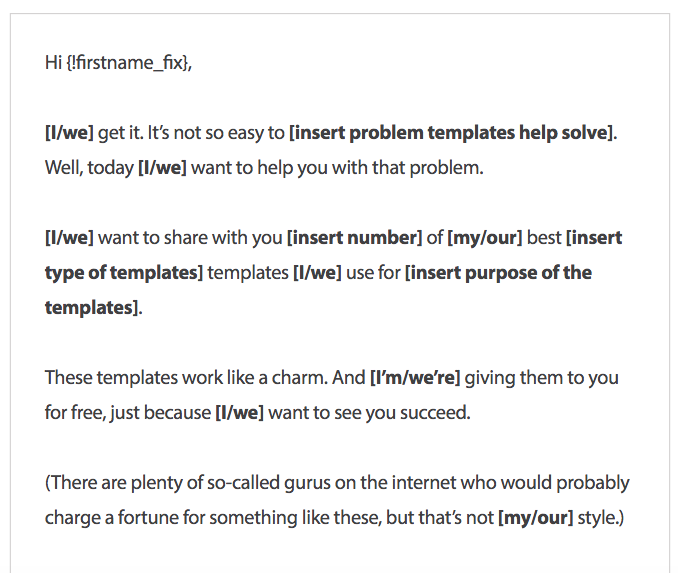[ad_1]
By Liz Willits November 9, 2022
Trying to build a lead magnet that actually grows your email list? Short on time? Read this post to learn how to create an effective lead magnet.
You’ve probably seen it yourself: websites offering huge gifts to compel website visitors to join their email lists — 10-page ebooks, 5-day courses, 25-page white papers and beyond.
These gifts are called lead magnets or incentives.
What is a lead magnet?
A lead magnet is a freebie you give your subscribers for joining your email list. A great lead magnet convinces the right people to subscribe to your list (those who are likely to buy), builds trust, and assists in converting your leads into customers.
The problem is, while a great lead magnet is a valuable list-growth tool, you probably feel overwhelmed by the idea of writing a 10-page ebook.
But I have good news: you don’t need to write a novel to create a great lead magnet. You can build a short, simple and crazy effective lead magnet with minimal time commitment.
Keep reading to learn how to create a lead magnet in six simple steps.
1. Find your audience’s biggest problem
People don’t join your email list to receive yet another email in their already cluttered inbox. They subscribe to your email list because they have a problem, and they’re hoping you can solve it. That’s what makes lead magnets so effective: they provide the solution to a person’s problem in exchange for an email address.
Before you invest time creating your lead magnet, you need to know what your audience’s problem is. By addressing their pain point, you will end up creating a more valuable lead magnet, which will lead to more subscribers.
You might already have some ideas about your audience’s problems. Or maybe you’re scratching your head and making wild guesses. To discover what your audience is actually struggling with, you need to conduct some research. Although “research” may sound boring and time consuming, there are a few fun and easy tricks for conducting excellent audience research:
Survey your current audience
Create a survey that asks your email subscribers about their current challenges and struggles. If you don’t have any email subscribers yet, ask your personal contacts or attend an in-person meetup and survey people there.
Read and ask questions on Quora
If you’re looking for questions or answers, Quora is a great place to be. Anyone can ask a question on Quora and anyone can answer that question.
To learn about your audience’s questions in particular, search Quora for questions related to your industry, product or service. See what people are asking and take a look at the view count on the answers given: lots of views equals lots of interest.
Or, ask a question yourself (like what challenges people within your target audience are facing). Or, if you already have a few lead magnet topic ideas, you can ask Quora users which option is their favorite.
Join a Facebook group
Become a member of a Facebook group within your industry and see what questions people are asking in the group or ask the group what problems they’re facing.
2. Choose a format that works for you, your audience and your schedule
The best lead magnets are those that are as brief as they can be while providing comprehensive information on a narrow topic (Brevity plus depth plus specificity equals awesome).
Yes, that’s right: your goal is to make your lead magnet as short as possible. That’s because short lead magnets take less time to create, but even more importantly, your audience needs less time to consume them. For instance, a 20-page guide is both a chore for you to write and for your audience to read.
Types of lead magnets
To select your format, choose from one of these lead magnet types that are both easy to consume and easy to create:
Checklists/Worksheets
Who can use it: health and wellness consultants, personal trainers, financial consultants, marketing consultants — anyone who helps people accomplish a task.
Example: take a look at this social media checklist created by SproutSocial.
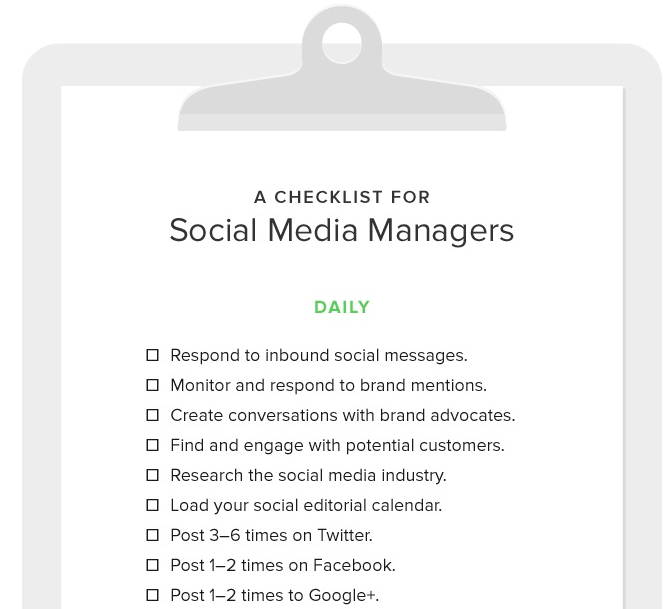
Example: Here’s a worksheet, The Ultimate Checklist for Headlines and Subheads by Copy Hackers.
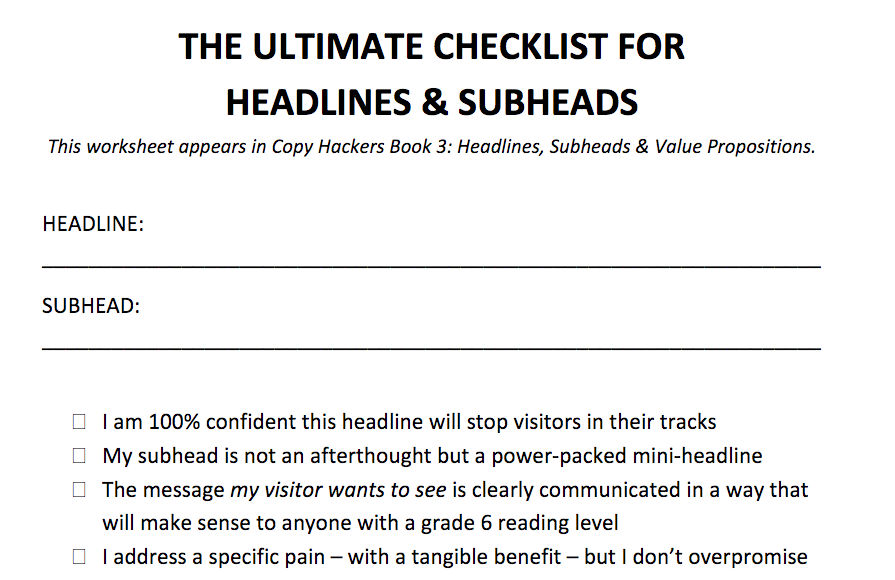
Coupons/Discounts
Who can use it: ecommerce stores, physical stores and anyone who sells a product or service
Example: This 10 percent discount on the Magnolia Market website is an excellent example of a discount/coupon lead magnet. The coupon code is delivered via a welcome email immediately after subscribing.
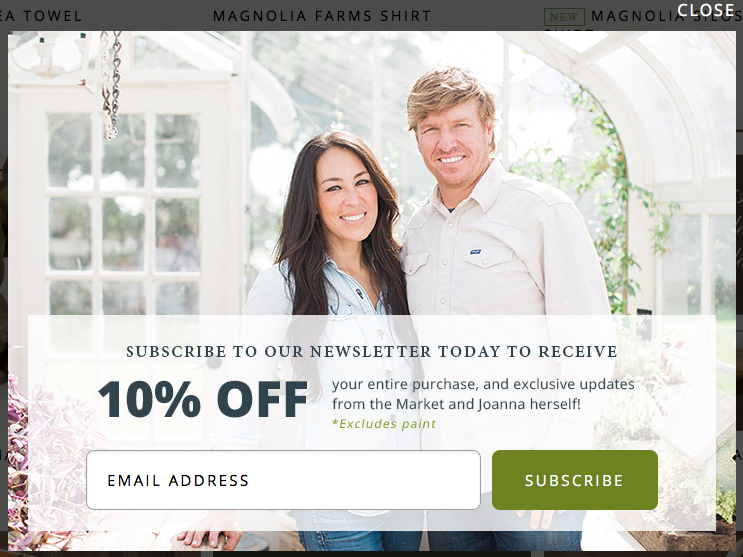
Plans/Schedules
Who can use it: fitness coaches, health and wellness consultants, marketing consultants, financial advisors and anyone whose audience could use help with planning/scheduling.
Example: Check out this 2-Week Paleo Diet Meal Plan from PaleoLeap.
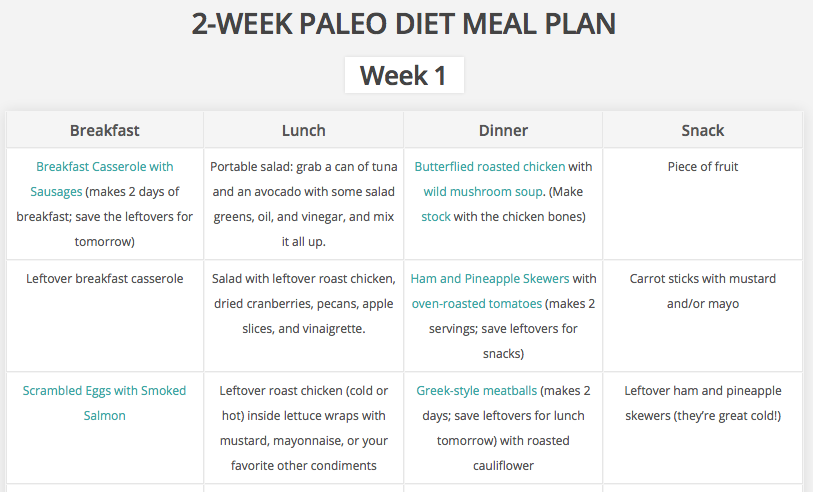
Templates
Who can use it: marketing consultants, financial consultants, fitness and wellness coaches, SAAS companies, tech companies and anyone whose audience could use guidance writing or designing content.
Example: We created 45+ free email templates to help email marketers with their email content. Our audience loves these templates, and they were also easy for us to create.
3. Write new content or repurpose existing
The next step is to start writing. While writing often seems overwhelming, it shouldn’t be. The types of lead magnets I listed above take very little time to write.
Follow these steps to simple get started:
Step 1: Sit down and write non-stop for an hour.
Step 2: Don’t edit anything at this point.
Step 3: If you’re creating a checklist, template, plan or coupon, an hour is more than enough time to write your draft.
Step 4: After you’re done drafting, go back and edit.
Here are a few writing pointers that will simplify and shorten your writing process and help you create a top-performing lead magnet:
Be specific
Remember our earlier step where we determined the problem/question that your lead magnet will solve or answer? Your lead magnet content has one purpose: answer or solve that problem.
Be precise. By writing a lead magnet that answers one question, you craft a shorter and more cohesive lead magnet. Not only do brevity and specificity make it easier for your audience to read your content, they also shorten the writing process for you — a win-win scenario.
Be efficient
Save time. Recycle your content.
Repurposing already written content is a great way to shorten the writing process. If you’ve already written blog posts or emails that help answer your audience’s problem, reuse that content in your lead magnet.
Be authoritative
Your lead magnet is more than just a gift you give people to get their email addresses. It’s a tool to bring your prospects closer to a buying decision. How so? Because it builds trust, and that’s important because people are more likely to buy from those they trust.
To instill trust with your lead magnet content, write with authority. Avoid using words like “in my opinion,” “I think,” “You should,” and other phrases that show uncertainty. These kinds of phrases are bad in two senses.
One, they are non-essential words that fail to convey any additional meaning. These words waste your reader’s time and wane their interest.
And two, these phrases take away from your authority.
As your readers consume your lead magnet content, they need to know that you are an expert worth listening to, and the words “I think…” don’t sound very convincing.
For example, take a look at these two sentences a financial advisor might write:
Sentence A: “In my opinion, you should invest in Amazon stocks this quarter.”
Sentence B: “Invest in Amazon stocks this quarter.”
It’s easy to tell that sentence B is the more powerful sentence; readers will trust the advice more because the writer sounds certain.
Be original
The best way to create a priceless lead magnet is to share original insights and tips.
Being original means sharing information that can’t be found anywhere else. If the tips you share in your lead magnet can be found in a basic Google search, your lead magnet isn’t all that valuable. After all, why should a prospect give away their email address for information they can get elsewhere or that they’ve already heard?
To be original, see what others have already written about your topic. Then, share insights that haven’t already been written about.
4. Host your lead magnet
Now that you’ve written your lead magnet, you need to figure out how your audience will access it. Here are three ways to host your lead magnet:
Use Google Sheets
If you build your lead magnet in a Google Sheet (this works well for checklists, worksheets and plans), then you can set the permission to view only and ask people to make a copy of the Google Sheet to start using your lead magnet.
You can see how this works in this lead magnet checklist from SumoMe.

Create a hosted PDF
If you choose to make a template, a PDF is a great way to host it.
To create your PDF, you can write your content in a free Google doc then convert it to a PDF. Click on file → Download as → PDF Document (.pdf) to do this.
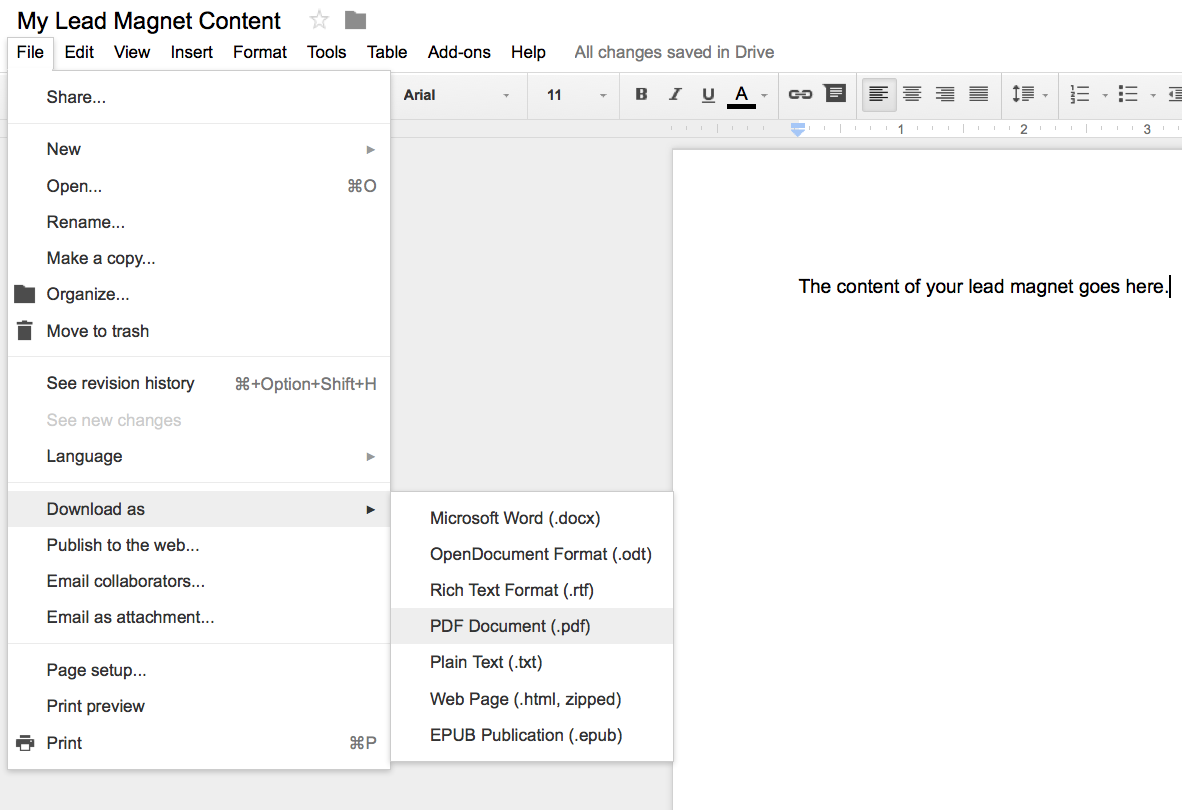
Once you have the URL for your PDF/downloadable file, hyperlink to the URL in your welcome email to give people access.
Email your lead magnet
This lead magnet distribution method works great for coupons and templates. It’s simple. Just write an email that includes your coupon code or the content of your template.
5. Write a welcome email that delivers your lead magnet
To instantly deliver your lead magnet, use an automated “welcome” email. Your welcome email not only provides the link (or access) to your lead magnet, it welcomes your new subscriber to your email list, tells them what they can expect from you and starts building a relationship with your audience.
To learn all about welcome email campaigns, read this blog post: Welcome Email Campaigns: How to Onboard New Subscribers.
6. Share your lead magnet with the world
By now, you’ve done all the hard work. You’ve chosen a lead magnet, created it and written a welcome email to deliver it. Way to go. Now it’s time for the final step: it’s time to build your sign-up form.
Your sign-up form is the gateway to your incentive and email list. It’s where people trade their email address for access to your lead magnet.
You can build your sign-up form one of two ways:
Add your sign-up form on your website
You can create your form with a third party software, like AWeber, then install it on your website.
Create a landing page with your form
You can also set up your lead magnet form on a dedicated landing page. The benefit of setting up your form on a landing page is there are no distractions. The purpose of a landing page is to have a singular focus, in this case, signing up for your lead magnet.
Here’s an example of a landing page template you can use in AWeber. This page is already set up to have a singular focus – signing up for on online cooking class. There are not other distractions on this page. Template like this are easy to customize with your own lead magnet. Just change the image and copy and you’re ready to go.
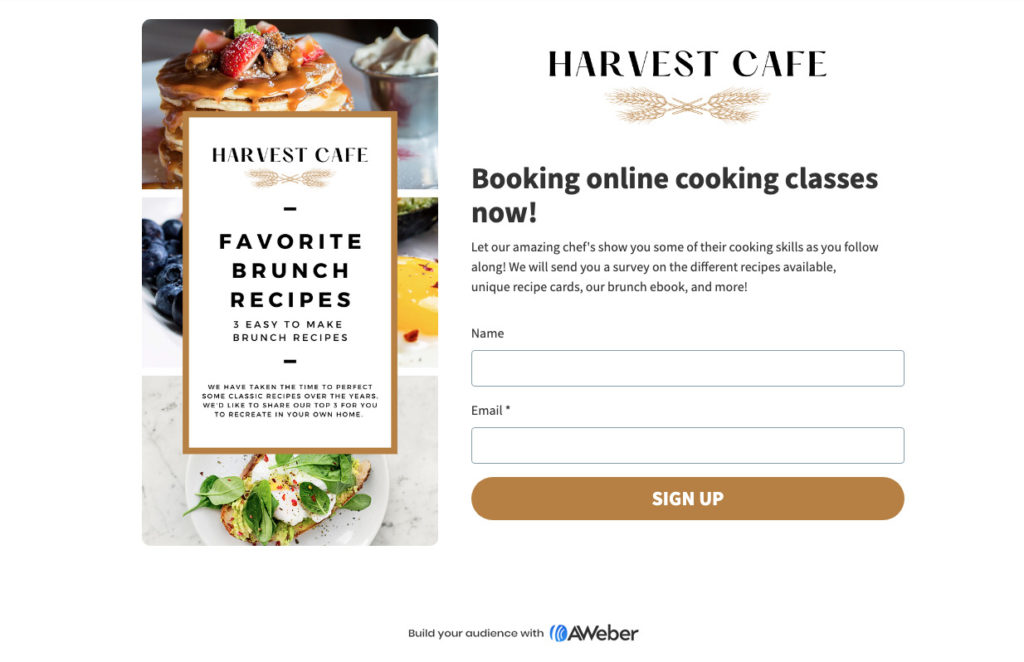
Lead magnet examples
It’s time to get inspired. We’ve put together a few of our favorite lead magnet examples for you to draw inspiration from.
The Essentials of Street Photography Ebook
New York photographer, James Maher, created this lead magnet which contains unique content and photos you can’t get anywhere else.
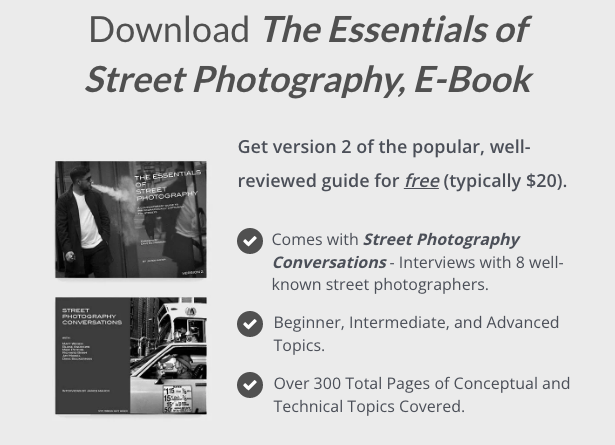
What to Write
This lead magnet was created based on feedback from our customers, who wanted to know how they could write better emails. This lead magnet contains pre-written emails, all they need to do is enter some information about their business and the emails are ready to be sent.
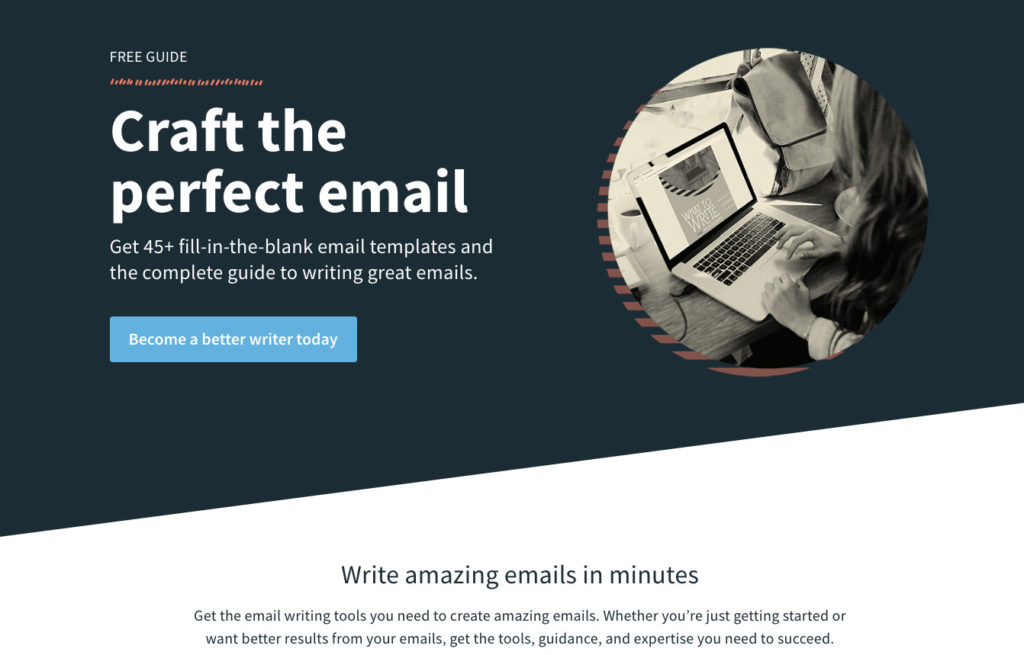
2 Second Arm Workout ebook
Shaped by H, provides a free 2 second arm workout ebook for his lead magnet. This is a great way to introduce potential customers to the type of workout you can expect.
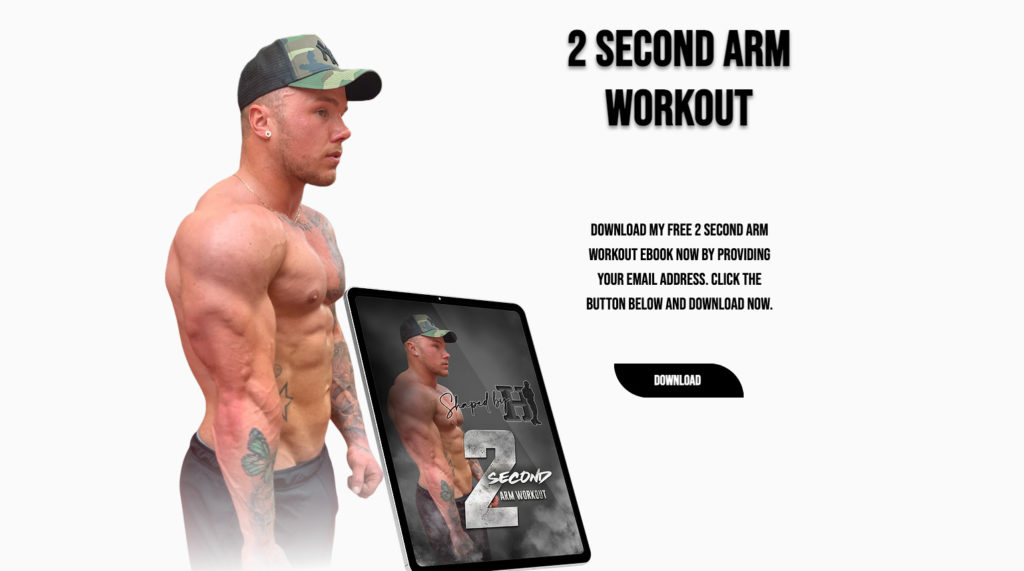
Mini Course
Relationship Coach, Bre Wolta, offers a free mini-course on how to identify toxic relationships.

Let’s wrap this up — your questions + more ways to grow your list
You don’t need days or even months to create a great lead magnet. Use the steps above to craft a lead magnet that makes website visitors excited to join your list.
Have any questions about lead magnets? Ask them in the comments section below. Or, share your lead magnet success story!
Bonus: See how photographer, and AWeber customer, James Maher using lead magnets as part of a strategy that helped him grow his email list by 300%.
[ad_2]
Source link


